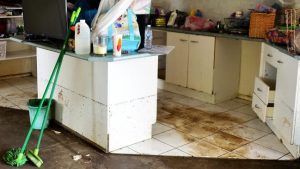13 Feb 2019
With flood waters subsiding in North Queensland, those affected now face a potential risk to their health with warm damp environments encouraging mould and mildew growth in homes.
CEO of Asthma Australia Michele Goldman says those with respiratory sensitivity needed to be particularly careful during the clean-up period.
“Mould and fungal spores are a known trigger for causing asthma,” she said. “Spores are airborne, as you breathe in, they enter the airways and can trigger serious breathing difficulties and allergic reactions.”
“It’s important that people with sensitive airways leave the responsibility for cleaning mould to someone who doesn’t have asthma. If this isn’t feasible they should wear good quality face masks while handling mouldy things or cleaning mouldy walls.
“Most important is for these people to stick to their Asthma Action Plan, be vigilant with asthma medication and to prioritise restoring a dry living environment as quickly as possible.
“Open windows and doors, air out homes and follow public health guidelines for cleaning mould.
“Assume all water-damaged items have mould growing on them. This is a massive task on top of clean-up efforts, but those with asthma or with young children must pay attention to mould removal.
“Be aware that your asthma may worsen in the coming weeks and months due to exposure to mould and fungal spores,” she said.


Image sourced from: ABC News
Asthma Australia is further warning that at back to school time, mould in schools and around the home could exacerbate asthma flare ups in school-aged children.
“Back to school time sees an annual peak in asthma hospitalisations due to summer viruses and I understand Townsville schools are struggling with controlling mould. School children with asthma in flood affected areas are at greater risk because these two risk factors are combined. Parents of these children need to have heightened awareness at this time and schools must ensure teachers are made aware of children with asthma,” said Ms Goldman.
“Keep asthma reliever medication on hand and follow your Asthma Action Plan.
“Young children shouldn’t be exposed to mouldy environments for long periods,” she said.
People with asthma who are more likely to have asthma triggered by fungal and mould spores include:
- Babies and children
- The elderly
- Those with existing allergies and skin conditions such as eczema
- Those with a lowered immune system
- People with severe asthma
People are advised that if they notice cold-like symptoms such as sneezing, blocked nose, coughing and shortness of breath while in warm damp environments, it could be an allergic reaction to spores of mould or other fungi.
It’s recommended these people see a General Practitioner to check for asthma.
One in nine people have asthma in Australia and Queenslanders have a higher than the national average prevalence of the chronic respiratory disease.
For information on how to safely clean mould and fungi from the home and how to manage asthma, people can visit https://asthma.org.au/about-asthma/triggers/flooding-and-mould/.
People who are experiencing difficulties with their asthma can phone the free 1800 Asthma (1800 278 462) service for confidential phone support and information.






